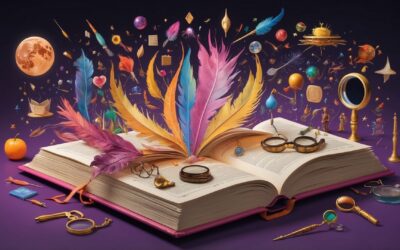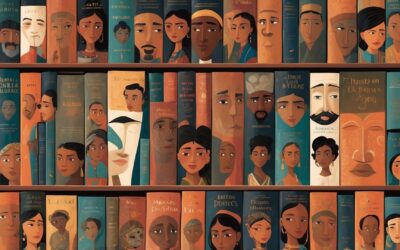In a dimly lit room, on a plush armchair, with the soft glow of a reading lamp highlighting the pages of a thick tome, sat Jane. She’d been engrossed in the sprawling saga of a family across generations for hours. Each chapter was a window into their souls, and every turn of the page was a promise of another revelation, another secret. Jane wondered, why was it that she, like countless others, found herself so deeply ensnared by the lure of the novel?
A Journey through Time
Since the birth of human consciousness, stories have been an integral part of our existence. From tales passed down orally from elder to child to the complex epics etched in cuneiform on ancient Sumerian tablets, the tradition of telling lengthy narratives is old as time. The novel, however, is a relatively recent phenomenon, tracing its roots back to the early modern period. But what is it about novels that captures our imagination so powerfully?
An Escape into Another World
One of the primary reasons we’re attracted to novels is the immersive escape they offer. Unlike shorter pieces, novels create expansive universes. Each description, dialogue, and subplot is a brushstroke painting a vivid world that readers can inhabit, if only for a few hours. It’s a break from reality, a vacation for the mind. In Jane’s case, she wasn’t just reading about the protagonist’s first heartbreak; she felt the sting of the rejection, heard the rain as it mirrored the protagonist’s tears, and saw the gray world the character now inhabited.
A Deep Dive into Human Psyche
Novels, given their length, allow authors to delve deep into the human psyche. They can meticulously craft multifaceted characters that are neither purely good nor purely evil. This depth resonates with us because, in reality, humans are similarly complex. We see our doubts, aspirations, flaws, and strengths reflected in these characters, making the connection intimate and personal.
The Ebb and Flow of Emotions
The length of novels also enables an ebb and flow of emotions. There’s a rhythm to the narrative. The crescendos of thrilling climaxes are balanced by the quieter moments of introspection. This rhythmic dance of emotions mirrors our own lives, making the experience holistic and therapeutic.
The Brain’s Reward System
From a psychological perspective, reading a novel can be equated to running a marathon, not in terms of physical exertion, but the reward mechanism. As we progress through chapters, overcome narrative hurdles, and solve mysteries alongside the protagonist, our brain releases dopamine, the feel-good neurotransmitter. This, combined with the sense of accomplishment upon completing a lengthy narrative, makes novels particularly enticing.
Social Connections and Tribalism
Historically, humans have been tribal creatures. The long narratives often revolve around familial ties, friendships, enmities, and alliances. Engaging with these intricate relationships in novels satisfies our innate desire for social connection and understanding societal dynamics.
The Promise of Resolution
Life is unpredictable. However, novels, despite their twists and turns, promise a resolution. This narrative closure is psychologically comforting. We’re assured that every subplot, every mystery, will eventually find its conclusion, making the journey worthwhile.
Growth and Transformation
Long narratives also promise character development. We’re not just introduced to a static character; we witness their growth, evolution, and transformation. This journey of transformation is not just limited to the character but extends to readers. As Jane navigated through her novel, she not only saw the protagonist evolve but found parts of herself growing and changing with the narrative.
Conclusion
The allure of the novel isn’t just about the pleasure of reading. It’s an intricate interplay of psychological, emotional, and sociological factors. The novel, in its expansive narrative, reflects life itself – complex, unpredictable, but always promising growth and understanding.
As Jane closed the last page of her book, she realized she wasn’t just closing a story. She was concluding a journey, one that took her through the spectrum of human emotion, making her laugh, cry, ponder, and most importantly, grow. The allure of the novel, she concluded, was the allure of life itself.
Keywords
- Tome: A book, especially a large, heavy, or scholarly one.
- Ensnares: To capture or entangle, as if in a trap.
- Cuneiform: An ancient system of writing in which wedge-shaped symbols represented words or syllables.
- Immersive: Deeply involving; able to captivate attention completely.
- Multifaceted: Having many facets or aspects; diverse.
- Crescendos: A gradual increase in loudness, intensity, or force.
- Neurotransmitter: A chemical substance in the body that helps send messages between nerve cells.
- Tribalism: The behavior and attitudes that stem from strong loyalty to one’s own tribe or social group.
- Allure: The quality of being powerfully and mysteriously attractive or fascinating.
- Innate: Inborn; natural.
Key Takeaways
- Novels have been an integral part of human culture, offering an escape into expansive and detailed universes.
- The depth and length of novels allow for a profound exploration of the human psyche.
- The rhythm of emotions within novels mirrors the highs and lows of real life.
- Reading lengthy narratives can trigger the brain’s reward mechanisms, making them pleasurable.
- Novels satiate our deep-seated need for social connection and understanding of societal dynamics.
- Unlike real life, novels promise a sense of resolution and closure.
- Readers not only witness character development in novels but often experience personal growth themselves.
- The attraction to novels stems from various psychological, emotional, and sociological factors.
Check out the Story of Literature Article Series
The Story of Literature: Delving into Humanity’s Timeless Narratives (Featured Article)
From Campfire Tales to Digital Screens: The Evolution of Storytelling
Drama through Time: From Ancient Shadows to Modern Stages
The Mesmerizing Power of Novels: A Deep Dive into Our Fascination with Long Narratives
Echoes of Society: The Deep Interplay between Literature and Cultural Values
Navigating the Digital Revolution: How Literature Evolves in a Tech-driven World
Universality in Literature: Uniting Hearts and Minds Across Cultures










0 Comments